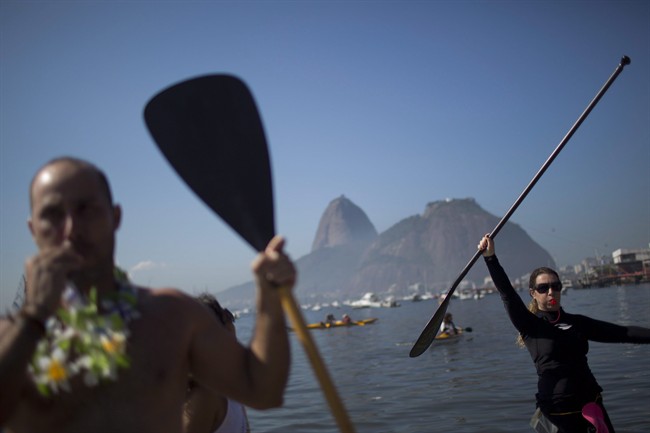RIO DE JANEIRO – Activists alleging that decades of neglect and authorities’ repeated failure to make good on cleanup promises have effectively killed one of Rio de Janeiro’s most iconic waterways staged Saturday a symbolic burial of the Guanabara Bay, the sewage-filled waters where Olympic sailing competitions are to be held.

The demonstration was held on one of the city’s most polluted beaches, Botafogo, which is enveloped in a sulfuric stench, dotted by household trash and looks out over the iconic Sugarloaf Mountain. Protesters placed a garbage-filled mock coffin on the fetid sands, which they also draped with black cloth.
The event’s organizer, biologist Mario Moscatelli, said the event was among last-ditch efforts to force state authorities to keep their promise of cleaning up the bay before the Aug. 5-21 Games.
READ MORE: Zika virus overshadows buildup to Rio de Janeiro Olympics
“This is an environmental crime,” said Moscatelli, wearing chest-high rubber coveralls and industrial goggles as he waded out into the dark waters to pluck out floating trash.
“If this is happening here, at the picture postcard symbol of Rio, imagine what’s happening in the interior of the country.”
He added that around seven months ago he denounced Rio’s state water utility, Cedae, for flooding the bay with untreated sewage. Moscatelli has several videos shot near the site of the protest showing a tidal wave of sewage pouring out from a Cedae facility and into the waters of Botafogo Beach. As neither federal nor state prosecutors have taken any action on the matter, Moscatelli said he intended to bring his complaint again.
WATCH: IOC sends medical advice to Olympic committees on Zika virus
Sewage pollution has become a major issue in the run-up to the Olympics since last year, when The Associated Press published the results of an independent study showing astronomical viral levels from untreated sewage in all of Rio’s water venues, where 1,400 Olympic swimmers, rowers, sailors, canoeists and triathletes will compete.
In Rio’s Olympic bid, authorities pledged to drastically reduce the amount of sewage flowing into the bay before the games, but with very little progress to date, officials here now acknowledge the targets won’t be met.
Athletes have expressed alarm over not only the sewage but also floating trash, which could potentially cause catastrophic accidents or cost teams medals. Earlier this week, the local O Globo daily ran a photo of what appeared to be a severed arm floating in the bay, but the details behind what happened were unknown.
- B.C. introduces legislation recognizing Haida Gwaii Indigenous title
- Whale experts confident B.C. orca calf will survive, find family if rescue plan succeeds
- Chemical plant shuts down after high benzene levels detected near Ontario First Nation
- Ontario takes action against chemical plant after Aamjiwnaang First Nation residents fell ill



Comments